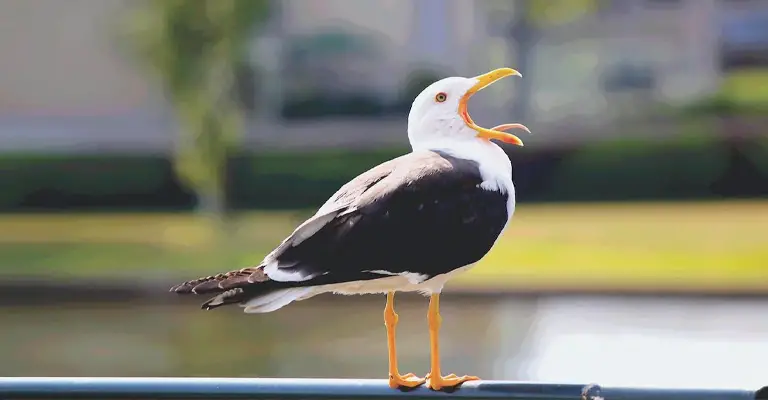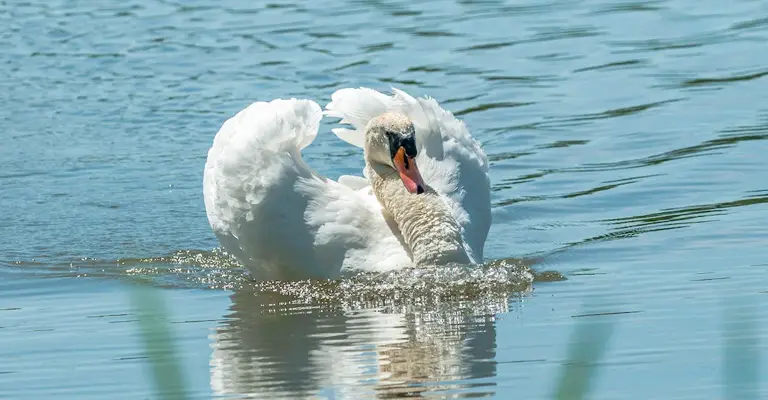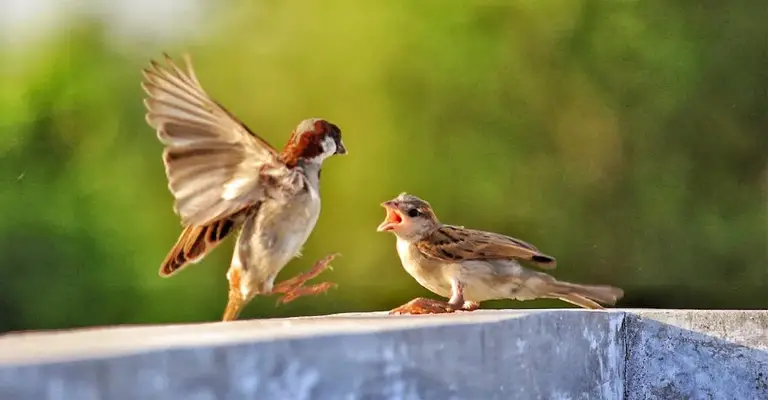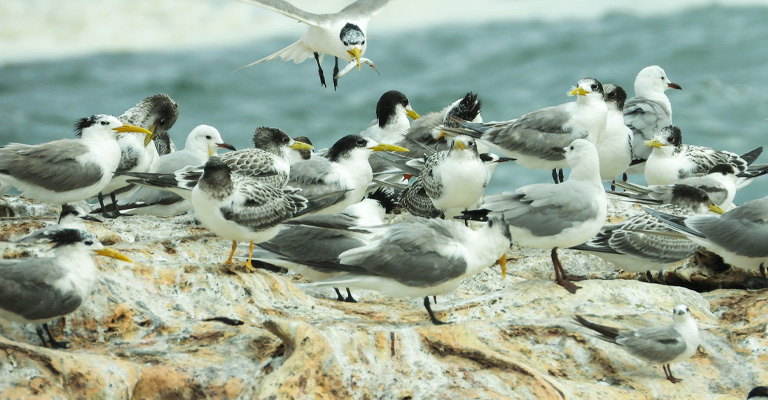Birds have captivated humans for centuries with their vibrant colors, graceful flight, and enchanting songs. Their ability to communicate through chirping is not only a means of survival but also a form of expression that varies among species and situations.
One intriguing aspect of bird behavior is their tendency to chirp after rain. This phenomenon has sparked curiosity and raised questions about the reasons behind this behavior.
In this article, we will delve into the world of birds chirping after rain, exploring the significance of rainfall on their environment, the various functions of chirping, and the species-specific variations that make each bird’s response unique.
So, let us embark on a journey to unravel the mysteries of birds chirping after rain and discover the fascinating world of avian communication.

Connection Between Birds and Rain
Birds have a unique relationship with rain, and there are several connections between the two. Here are some key aspects of the connection between birds and rain:
Foraging Opportunities
Rainfall often leads to an increase in insect activity. The moisture and humidity that come with rain create favorable conditions for insects to emerge or become more active. This abundance of insects presents a feeding opportunity for birds.
They chirp after rain as they actively search for and consume these insects, taking advantage of the temporary surge in food availability.
Bathing and Feather Maintenance

Rainfall provides birds with an opportunity to bathe and maintain their feathers. Clean feathers are essential for flight, insulation, and protection against environmental elements.
After the rain, birds may engage in preening activities, using their beaks to arrange and condition their feathers. Chirping can be observed during this time as birds communicate and socialize with others while engaging in these maintenance behaviors.
Breeding and Nesting Behavior
Rainfall can also influence bird breeding and nesting behavior. In some bird species, rain can trigger breeding activities or influence the timing of breeding cycles.
The availability of water sources due to rain can contribute to creating suitable environments for nesting and raising offspring. Chirping after rain may serve as a signal related to courtship, pair bonding, or territorial communication as birds prepare for or engage in the breeding season.
Ecological Adaptations
Birds have adapted to various environmental conditions, including rain. Some bird species have evolved specific adaptations to cope with wet weather.
Their feathers may have specialized structures that repel water or enhance waterproofing capabilities. Certain birds, like waterbirds or shorebirds, are particularly associated with wet habitats and rely on rainfall to maintain suitable conditions for their survival and foraging.
The Science Behind Bird Chirping

Besides the relationship between the bird and the rain, you need to understand two specific factors to get a clear thought about why birds chirp after the rain.
The first one of their vocalization as communication and the second one is the influencers of Bird’s vocalization. Let’s check them out in short.
Vocalization as a Form of Communication
Birds use vocalization as a primary means of communication within their species. Chirping, singing, and calling convey various messages and information to other birds.
These vocalizations serve purposes such as attracting mates, defending territories, warning of danger, and maintaining social cohesion.
Factors Influencing Bird Vocalization

The following facts usually influence the bird’s vocalization.
Environmental Cues
Birds are highly attuned to their environment and respond to various cues in their surroundings. Factors like temperature, weather conditions, and time of day can influence their vocalization patterns.
For example, birds may adjust their calls and songs to communicate during specific times or in response to changes in their environment.
Breeding and Mating Behavior
During the breeding season, bird vocalization plays a crucial role in courtship and mate selection. Male birds often produce elaborate songs to attract females and establish their fitness as potential mates.
Female birds may also vocalize to indicate their receptiveness to mating or to communicate with their partners during the breeding process.
Territorial Defense
Birds are known to defend their territories vigorously. Vocalization serves as a key component of territorial defense, as birds use their calls and songs to assert their presence and ward off intruders.
These vocal signals help establish boundaries and prevent conflicts between individuals of the same or different species.
Why Do Birds Chirp After Rain?

There can be many different reasons why a bird can chirp after it rains. The most common reasons are listed right below. Make sure to take a look over the details to understand them well.
1. Foraging for Food
After rainfall, birds chirp as they forage for food. The wet soil makes it easier for earthworms to move to the surface, and the rain also washes away protective coverings of various insects, exposing them to hungry birds.
This increased availability of prey prompts birds to engage in vocal communication to inform others about the bountiful feast. Their melodious chirping acts as a dinner bell, attracting attention and creating a feeding frenzy.
By vocalizing, birds not only locate their next meal more efficiently but also let their feathered friends know that dinner is served. It’s nature’s way of spreading the word and maximizing their chances of a successful hunt.
2. Territory Communication
Birds chirp after rain as a means of territory communication. Rainfall can disrupt the usual activities of birds, leading to temporary separation among individuals.
Chirping serves as a way for birds to reestablish contact and regroup. By vocalizing, birds locate and communicate with their flock members, reaffirming social bonds and ensuring collective safety.
Additionally, birds use their songs to assert territorial ownership. The dampened environment after rain carries sound more effectively, allowing their melodies to travel greater distances.
Chirping becomes a powerful means of proclaiming presence, warning intruders, maintaining territorial boundaries, reinforcing their dominance, and protecting valuable resources.
3. Courtship and Mating Behavior
Birds chirp after rain as part of their courtship and mating behavior. The dampened environment enhances the transmission of their songs, allowing them to be heard by potential mates from greater distances.
Male birds utilize their melodious songs to attract females, demonstrating their vitality and genetic fitness. Chirping serves as a means of communication to convey their availability and readiness to mate.
The post-rain period provides an ideal opportunity for birds to engage in these courtship rituals, as the refreshing conditions and increased activity levels contribute to a vibrant and captivating display of song and dance, ultimately increasing their chances of successful reproduction.
4. Joy and Relief
Birds chirp after rain to express joy and relief. The cooler and refreshing atmosphere that follows rain showers brings a sense of rejuvenation to birds.
Their vocalizations serve as a way to communicate their excitement and happiness. Chirping acts as an expression of relief from uncomfortable heat or humidity, signaling their contentment with the improved conditions.
This melodic outburst reflects their sheer delight in the post-rain environment, providing a glimpse into the positive emotions experienced by these avian creatures.
5. Species Variations
Different bird species may exhibit variations in their chirping behavior after rain. While the general reasons for chirping remain consistent across species, there may be subtle differences in the timing, duration, or intensity of their vocalizations.
Some species might be more vocal and enthusiastic, using intricate songs to attract mates or establish territories. Others may have simpler, shorter chirps mainly aimed at locating food sources.
These species-specific variations in chirping behavior reflect the unique adaptations and ecological niches of different birds, adding to the diverse tapestry of avian communication in response to rainfall.
It’s important to note that the exact reasons for birds chirping after rain can vary depending on the species and their specific behaviors. Different bird species may exhibit different vocalization patterns and have unique responses to rainfall.
Bird Species and Their Chirping Behavior After Rain
| Bird Species | Chirping Behavior after Rain |
| Robin | Chirps to establish territorial boundaries and attract mates |
| Nightingale | Sings complex and melodious songs after rain, often associated with courtship |
| Sparrow | Emits short and repetitive chirps to communicate presence and search for food |
| Woodpecker | Engages in rhythmic tapping sounds on trees as a form of communication after rain |
| Mockingbird | Mimics the sounds of other birds and incorporates them into its repertoire after rain |
| Blackbird | Vocalizes loudly and melodically after rain, often associated with territorial displays |
| Warbler | Chirps high-pitched and rapid songs to attract mates and establish territory after rain |
| Blue Jay | Utilizes loud and harsh calls after rain, potentially as a warning signal to other birds |
| Canary | Sings melodic and varied songs after rain, expressing happiness and contentment |
| Hummingbird | Produces rapid chirping sounds while hovering near flowers, possibly related to feeding |
Note: The table provides examples of different bird species and their specific chirping behaviors observed after rain. Please note that chirping behavior can vary within species due to regional variations and individual characteristics
FAQS
Birds can chirp after rain at various times of the day. However, mornings and evenings are often prime times for increased vocalization, as these periods are associated with heightened activity levels and the establishment of territories or courtship rituals.
While some people associate birds chirping after rain with the notion that rain is ending soon, there is limited scientific evidence to support this claim.
Bird chirping after rain is primarily linked to their behaviors, such as foraging for food or expressing happiness, rather than predicting weather patterns.
The behavior of birds after heavy rain may differ from their behavior after light rain. Heavy rain can disrupt their foraging activities and make vocalizations less frequent.
In contrast, during light rain, birds may continue their regular activities and chirp intermittently as they take advantage of the food resources brought to the surface.
Yes, birds chirping after rain can differ between breeding and non-breeding seasons. During the breeding season, birds may increase their vocalizations to attract mates or defend their territories.
Conclusion
Bird chirping after rain is a fascinating behavior that showcases the diverse ways in which different bird species respond to environmental changes.
The refreshing effect of rain on the birds’ environment, including the cleansing of feathers and relief from hot or dry conditions, contributes to their increased vocalization.
Beyond practical purposes, the chirping after rain may also be a reflection of the birds’ sheer joy and enthusiasm. The refreshing and invigorating effect of rainfall can evoke a sense of exuberance in these feathered creatures, which they express through their lively songs.
It reminds us of the wonders of nature and the interconnectedness of all living beings. So, the next time you hear the melodious chorus of birds after rain, take a moment to appreciate their remarkable resilience and the beauty they bring to our world. Thank you.